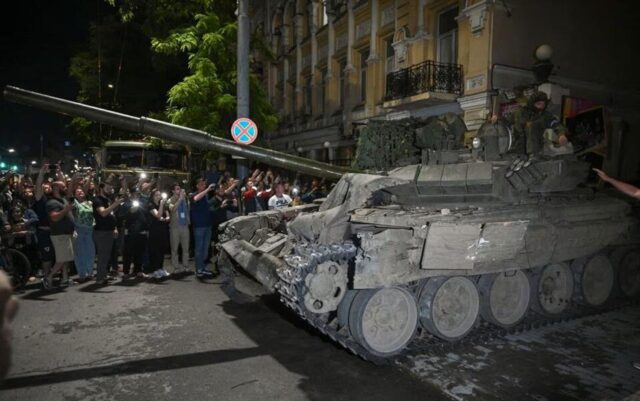OPINION: Russian President Vladimir Putin looked into the abyss on Saturday and blinked. After vowing revenge for what he called an “armed mutiny”, he settled for a compromise, writes David Ignatius.
By David Ignatius
PRESIDENT Vladimir Putin looked into the abyss on Saturday and blinked. After vowing revenge for what he called an “armed mutiny”, he settled for a compromise.
The speed with which Putin backed down suggests that his sense of vulnerability might be higher even than analysts believed. Putin might have saved his regime on Saturday, but this day will be remembered as part of the unravelling of Russia as a great power — which will be Putin’s true legacy.
Putin’s deal with renegade militia leader Yevgeniy Prigozhin is likely to be a momentary truce, at best. The bombastic rebel will head for Belarus, in a deal brokered by his pal President Alexander Lukashenko, in exchange for Putin dropping charges against him and his mutinous soldiers, according to Kremlin spokesman Dimitry Peskov.
This was a real coup, until it wasn’t. For much of Saturday, Prigozhin was marching units of his 25,000-man Wagner militia toward the gates of Moscow, rolling through Russia’s Ukrainian command headquarters at Rostov-on-Don and north to Voronezh. Sources tell me the Russian FSB put up roadblocks along the way, to little effect. Putin called up the National Guard to defend Moscow.
As Putin said in a blood-curdling address on Saturday, this was becoming a 1917 moment, when the nation was reeling from another misbegotten war and, in Putin’s words, “Russians were killing Russians, brothers killing brothers.”
Throughout the day, the questions that raced through Washington and other world capitals was whether Prigozhin would continue his “march for justice” on the capital — and if Putin would order Russian troops to fire on the rebels to halt their advance. Sources tell me that as the Wagner forces moved north, the regular army neither followed nor hindered them.
Only madmen jump into the abyss in situations like this, and neither Putin nor Prigozhin is crazy. This was like a game of chicken where both cars swerve in the end, or a duel where both fighters shoot in the air, to fight another day.
Putin had only bad choices, and he knew it. Chechen forces commanded by Ramzan Kadyrov would have been the vanguard of his attack on Wagner in Rostov; that would have been a savage mess. Putin couldn’t be sure whether regular army units would obey his orders. He was walking into a situation he couldn’t control. Putin doesn’t do that — with the exception of his insane miscalculation invading Ukraine.
What’s notable about this mad 24 hours is that Putin managed to defuse the crisis without any big military confrontation. He has been humbled by a headstrong crony, to be sure, but he’s still in control. It was a close shave, not a decapitation.
Putin is easy to caricature, but he has an unusual gift, if one can call it that, for authoritarian rule. With his ice-blue eyes, he embodies the phrase “never let them see you sweat.” He lets others feud beneath him, refusing to intervene over the past year as Prigozhin lobbed almost daily insults at Russian Defense Minister Sergei Shoigu. Putin acts as if it’s beneath him to dirty his hands in such petty quarrels.
But Saturday was different. With his invocation of 1917, Putin took Russians back to the shattering domestic strikes that followed their reversals in World War I. “Intrigues and arguments behind the army’s back turned out to be the greatest catastrophe, destruction of the army and the state, loss of huge territories, resulting in a tragedy and a civil war,” he said Saturday.
Now as then, he said, the enemy was external. “Against us, the whole military, economical and information machines of the West are turned,” he said. That toxic mixture of Russian insecurity and national pride continues to be Putin’s fuel as a leader.
The Biden administration’s response to this mad day in Russia seemed to be a version of the advice attributed to Napoleon: “Never interrupt your enemy when he is making a mistake.” That, as well as the usual Biden prescription: focus on allies and partners.
President Biden and his team stayed in contact with foreign leaders. White House and State Department officials spoke to the other major democracies, known as the Group of Seven; they added India and Australia as members of the “Quad.” They consulted with Nato and the European Union.
The message in all these calls, I’m told, was “cool it.” Don’t make the crisis in Russia more dangerous by seeking to intervene or profit from the disarray. This message was focused especially on Ukraine; US officials stressed their desire that Kyiv not seem to take advantage of the strife in Russia in ways that might spiral into an even more dangerous moment. The Ukrainians, from what we can see, followed that advice.
What comes next, surely, is more trouble for Putin in Ukraine. Prigozhin told the truth flat out in the days before his march on Moscow. Ukraine didn’t threaten Russia, and Russia’s invasion was unnecessary — a mistake of epic proportions. Even Putin, the ice man, can’t freeze the burning truth of his Ukraine disaster.
* David Ignatius writes a twice-a-week foreign affairs column for The Washington Post. His latest novel is “The Paladin”.
** The views expressed her are not necessarily those of the DFA.
– THE WASHINGTON POST








